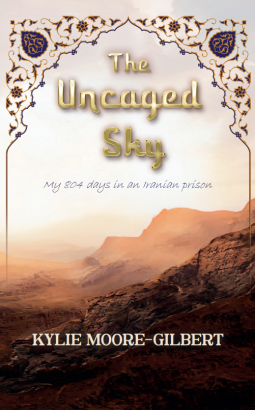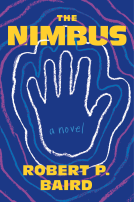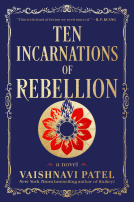
The Uncaged Sky
by Kylie Moore Gilbert
This title was previously available on NetGalley and is now archived.
Send NetGalley books directly to your Kindle or Kindle app
1
To read on a Kindle or Kindle app, please add kindle@netgalley.com as an approved email address to receive files in your Amazon account. Click here for step-by-step instructions.
2
Also find your Kindle email address within your Amazon account, and enter it here.
Pub Date Oct 24 2023 | Archive Date Oct 24 2023
Urano World USA Inc | Urano Publishing
Talking about this book? Use #TheUncagedSky #NetGalley. More hashtag tips!
Description
On September 12, 2018 British-Australian academic Kylie Moore-Gilbert was arrested at Tehran Airport by Iran’s feared Islamic Revolutionary Guards. Convicted of espionage in a shadowy trial presided over by Iran’s most notorious judge, Dr Moore-Gilbert was sentenced to 10 years in prison.
Incarcerated in Tehran’s Evin and Qarchak prisons for 804 days, this is the full and gripping account of her harrowing ordeal. Held in a filthy solitary confinement cell for months, and subjected to relentless interrogation, Kylie was pushed to the limits of her endurance by extreme physical and psychological deprivation.
Kylie’s only lifeline was the covert friendships she made with other prisoners inside the Revolutionary Guards’ maximum-security compound where she had been ‘disappeared’, communicating in great danger through the air vents between cells, and by hiding secret letters in hava khori, the narrow outdoor balcony where she was led, blindfolded, for a solitary hour each day.
Cut off from the outside world, Kylie realized she alone had the power to change the dynamics of her incarceration. To survive, she began to fight back, adopting a strategy of resistance with her captors. Multiple hunger strikes, letters smuggled to the media, coordinated protests with other prisoners and a daring escape attempt led to her transfer to the isolated desert prison, Qarchak, to live among convicted criminals.
On November 25, 2020, after more than two years of struggle, Kylie was finally released in a high-stakes three-nation prisoner swap deal orchestrated by the Australian government, laying bare the complex game of global politics in which she had become a valuable pawn.
Written with extraordinary insight and vivid immediacy, The Uncaged Sky is Kylie Moore-Gilbert’s remarkable story of courage and resilience, and a powerful meditation on hope, solidarity and what it means to be free.
Advance Praise
Tom Griffiths- Australian Book Review Books of the Year 2022
https://www.australianbookreview.com.au/abr-online/archive/2022/december-2022-no-449/984-december-2022-no-449/9931-books-of-the-year-2022
Kylie Moore-Gilbert’s vivid, harrowing memoir, The Uncaged Sky: My 804 days in an Iranian prison (Ultimo Press 6/22) is essential reading as we follow the waves of street protests in Iran today. Written with gripping immediacy, it is informed by forgiveness: her departure from Iran is ‘both a homecoming and an exile.’
Arushi Ganguly- Australian Institute of International Affairs
https://www.internationalaffairs.org.au/australianoutlook/book-review-the-uncaged-sky-my-804-days-in-an-iranian-prison/
Borne out of her gruelling experience of living in Iranian prisons for two years comes a compelling memoir where Dr Kylie Moore-Gilbert reminds us of the human faces behind the hostage diplomacy frequently practiced by the Iranian state.
In 2018, a name hitherto unknown to the public in Australia suddenly began making headlines. Australians were taken aback when one of their own, a well-respected academic was put behind bars by the Iranian government on charges of espionage. As the government kept the progression of diplomatic negotiations close to its chest, Australians relied on oblique news reports with differing accounts of the academic’s welfare. Then, on a sunny morning in November 2020, Dr Moore-Gilbert touched down on Australian soil after 804 days in Iranian prison, in an apparent prisoner exchange brokered by Indonesia.
Dr Moore-Gilbert accounts for her state in the prison in her own words. The Uncaged Sky spans just over 400 pages and covers the academic’s life just before, during, and immediately after her imprisonment. The book starts with Moore-Gilbert’s imprisonment in a Tehran airport, sans warning. She then recounts the people she met in the preceding days and the hastened manner in which she was accused and imprisoned of charges she did not understand, in a language she was not proficient in. The first three chapters describe Moore-Gilbert’s solitary confinement at Evin Prison and her later abrupt transfer to Gharchak Women’s Prison, before ultimately returning to Australia with the aid of diplomatic negotiations.
The book is a story of survival. Moore-Gilbert attempts to make the best of a situation she was unwillingly thrust in. Even when put in solitary confinement, she finds ways of meeting people. She makes the acquaintance of fellow political prisoners, Niloufar Bayani and Sepideg Kashsni, going against orders and standing on latrines to be able to talk to her friends. Her compassion and friendliness often become a weakness, as Moore-Gilbert describes the various times when people she assumed to be confidants turned out to be informants. It is a sordid tale of an ordinary citizen having to watch their back constantly. Moore-Gilbert, however, endures, watches, observes and learns. She describes instances where, after facing yet another session in the kangaroo courts of Iran, she returned to her cell and danced with her mates, sharing her meagre wealth of fruits in a sad rendition of a feast.
The academic in Dr Moore-Gilbert shines throughout the book. Even in prison, her thirst for knowledge is insatiable. She seeks out intellectual conversations, even when she knows her opinions may land her in trouble. She documents her conversations with fellow prisoners, learning of their lived experiences and comparing these instances to what she knew of the country before her imprisonment. She recounts watching religious proceedings and festivals with a keen eye, her appreciation for the culture growing in tandem with her distrust over the state institutions. She expresses frustration over the conspiracy theories touted by state officials. She negotiates to get access to books, volunteers to teach fellow prisoners, and gives herself agency by learning the language of her captors. The book is interspersed with pictures. Most notably, there are cartoons that Dr Moore-Gilbert herself etched. The drawings speak of escapism and a need to document her experience, like a true academic.
The book also speaks to the dehumanisation of prisoners. In a particularly heart wrenching episode, Dr Moore-Gilbert describes feeling overwhelmed by the outside world after having spent months living in solitary confinement. With Iran facing rising tariffs under the Trump administration and the prisons sweltering after the 2019 protests over rising prices, Dr Moore-Gilbert narrates the bleak conditions in the prison. After moving to the Gharchak prison, her account becomes more depressing, with repeated instances of innocent young mothers being imprisoned on false charges. Reflecting on her own experience, Moore-Gilbert writes that she had to distance herself from her identity as an Australian, as an academic, as a person with a family awaiting their return in order to continue living the monotonous life of a convicted criminal.
Dr Moore-Gilbert insists that she is not the exception. That she is, in many ways, protected by her status as a foreigner. She speaks sympathetically not only about her fellow prisoners, but prison officials as well. She talks about the compassion that hides underneath the façade of a loyal servant to a draconian state. Indeed, in the epilogue, she states that Iran itself is “an open-air prison of 84 million people.” This is perhaps the greatest strength of the book, that Dr Moore-Gilbert does not seek people’s veneration by recounting her story. Instead, she wants people to think about, and advocate for others stuck in Iranian prisons. Even in her last moments in Iranian airspace, she reflects on the other prisons that impacted her life in the past two years.
Hostage diplomacy is a tool frequently used by Iran. The Center for Human Rights in Iran provides a catalogue of dual nationals currently and previously imprisoned in Iran. Many of them, like Dr Moore-Gilbert, visited the country for personal or professional reasons and were subsequently imprisoned on charges of espionage. Due to their nationality, their cases are documented. There are, however, no such catalogues for Iranian citizens unfairly imprisoned by their own government. Moore-Gilbert provides a firsthand account of the unjust justice system in Iran, where people are treated as guilty even before their sentence is finalised. There are also testimonies of physical abuse, sexual intimidation, and a general lack of sanitation and wellbeing in these prisons.
The Uncaged Sky offers a rare insight into an infamous system many of us will have the fortune of never confronting personally. The book provides a criticism of the farcical justice system in Iran. It showcases how the leadership in the country turns viciously against its own people at the slightest hint of treason. Through second-hand recollection, Moore-Gilbert shows us that women often bear the worst brunt of the unfair system in the country, with many spending lengthy sentences because of crimes their spouses committed. She insists, even after her horrid experience, that the culture and the people are not the same as the state. This is a book that appeals not just to those who study the Middle East, but to the wider Australian population in general.
Hessom Razavi- Australian Book Review
https://www.australianbookreview.com.au/abr-online/archive/2022/june-2022-no-443/978-june-2022-no-443/9216-hessom-razavi-reviews-the-uncaged-sky-my-804-days-in-an-iranian-prison-by-kylie-moore-gilbert
Eating air: An Australian academic’s ordeal in Iran
Dr Kylie Moore-Gilbert was arrested at Tehran International
Airport on 12 September 2018 as she prepared to
return home to Australia. A lecturer in Islamic Studies
at the University of Melbourne, she had visited Iran for a seminar
on Shia Islam. Her captors were the Iranian Revolutionary Guard
Corps, or the Sepâh, a powerful militia that protects Iran’s Islamic
system. She was bundled into a car and driven to a secret location.
As interrogations began, she was also served a large piece of
chocolate cake. The nature of this first encounter, terrifying and
strange, would typify her coming dealings with the Sepâh, an outfit
that seemed as haphazard and amateurish as it was menacing.
Moore-Gilbert was accused of being a Zionist spy, ostensibly
due to her husband’s Russian-Jewish heritage and her own
travels to Israel. Soon, she found herself in a two-square-metre
cell in Evin, Iran’s most notorious political prison. Her panic
was overwhelming, giving way, over weeks, to a numbing of her
faculties. ‘The terror of being left alone … was greater even than
my early fears of physical or sexual assault,’ she wrote. Hauntingly,
she tracked time through the morning cries of parrots roosting
nearby. When escorted to a small open-air balcony for hava khori
(yard time: literally ‘eating air’), she gazed upwards. ‘The sky above
our heads was uncaged and unlike us, free.’
In The Uncaged Sky, what ensues is an astonishing account
of Moore-Gilbert’s 804 days in prison, first at Evin, then at the
remote desert prison of Qarchak. In exquisite detail, she reports
the psychological torture and unexpected reprieves of prison life:
disgusting toilets and planted informants one day, a lenient warden
the next. Along the way, complex relationships develop, not least
with her case manager. This man, bizarrely, seems to harbour romantic
notions for her, in a kind of reverse-Stockholm Syndrome.
It’s a toxic dynamic where she is both rewarded and punished (think
chocolate cake/interrogation). At her trial in June 2019, she was
found guilty of espionage and sentenced to ten years in prison. She
suspects that the Sepâh accepted her innocence but went on detaining
her for ransom. As an inmate explains, ‘It’s not about determining
whether you’re innocent or guilty, it’s about determining your price.’
In the face of this trauma, Moore-Gilbert’s resilience is
jaw-dropping. In her finest moments, she plays jailyard soccer,
pens secret letters, learns Farsi, celebrates Ramadan, and retains
her sense of humour (‘Nice legs!’ she yells, clinging to an ambassador’s
calves). Despair and exhaustion shadow these high points,
as does a gnawing alienation from her husband. Exasperated, she
stages hunger strikes, and begins to defy and humiliate her captors.
At times she wonders if these protests are counterproductive
(as a family member of former political prisoners, I nodded at
these concerns). ‘These men have egos – enormous, fragile ones,’
a friend warns her. Crucially, she is supported by other women
through an ingenious system of hidden notes and solidarity.
In both Evin and Qarchak, Moore-Gilbert’s manoeuvring,
whether tactical or mundane, is critical to her sense of control.
One is reminded of Viktor Frankl’s Man’s Search for Meaning (1946),
an account of surviving Auschwitz. Like Frankl, Moore-Gilbert
seeks hope through small actions and personal encounters.
‘What saved me was the sense that I was an active participant
in my fate and destiny,’ she has since stated. To the judge who issued
her sentence, she wrote, ‘I am still free, because freedom is an
attitude, freedom is a state of mind.’
After protracted negotiations between Canberra and Tehran,
Moore-Gilbert was released on 25 November 2020. Ironically, her
emancipation began in confinement, this time in hotel quarantine.
There, she received a final blow, confirmation of her marriage’s
dissolution. In public appearances since, she appears relaxed, psychologically
intact, and frank about her well-being. ‘I feel a bit detached
from it,’ she has professed, ‘like it happened to someone else.’
Beyond its testimonial value, The Uncaged Sky illuminates
broader issues. Moore-Gilbert was released as part of a prisoner
exchange, where three Iranians charged with a bomb plot were
freed in Thailand. This raises uncomfortable questions about Australia’s
participation in, and hence enablement of, hostage-trading
practices. (Moore-Gilbert has called for international frameworks
to disincentivise these extortions.) Attention is also drawn to the
treatment of imprisoned women in Iran. As reported by Amnesty
International, and by some Iranian officials themselves, the sexual
harassment and rape of prisoners by their interrogators have been
alleged, and may be under-reported. This is an international human
rights issue of ongoing concern. Western states, meanwhile, are not
exonerated. Among developed nations, Australia retains perhaps
the cruellest carceral system for refugees. As such, Moore-Gilbert’s
work may invite comparisons with Behrouz Boochani’s No Friend
But the Mountains (2018). Both memoirs bear witness to the
arbitrary detention of civilians, for the political gain of a regime.
As a work of prison literature, The Uncaged Sky is an utterly
engrossing book. The repetitiveness of some sections may leave
readers feeling exhausted; the effect may be intended to delay
the author’s relentless ordeal. Here, the narrative could have benefited
from providing summaries or synthesis; Moore-Gilbert’s
analyses of hostage negotiations or Iranian politics, for example,
are welcome and astute. Authorial integrity is evident in her balanced,
three-dimensional portrayals of her captors. ‘I saw the full
spectrum of the human character among their ranks,’ she writes.
In doing so, she resists the temptation to demonise all Iranians,
instead finding that human decency, depravity, and ambivalence
are universal and coexistent. In the prisoners who protect her,
or the guards who turn a blind eye, and indeed through her own
machinations, we observe people caught in an oppressive system
who seek out agency and self-expression – freedoms of a sort.
Benjamin Weinthal- The Jerusalem Post
https://www.jpost.com/middle-east/iran-news/article-718498
‘Uncaged Sky': How a woman survived 804 days in an Iranian prison - review
Kylie Moore-Gilbert delves into the psyche of the wild conspiracy theories that occupy the minds of the ruthless men who wield power in the theocratic state of Iran.
British-Australian academic Kylie Moore-Gilbert is imbued with scholarly brilliance, energy and a burning desire to fight. The fire in her belly helped her survive the Iranian regime’s penal colony, where she was held hostage for more than two years – 804 days – between 2018 and 2020. Her book The Uncaged Sky: My 804 days in an Iranian prison joins the pantheon of profoundly important books chronicling the crimes of totalitarian regimes.
For those who follow Moore-Gilbert on Twitter (and I recommend that Middle East observers follow her), she writes and works tirelessly to secure the release of Iranian political prisoners and foreigners used as hostages who are tossed into the vast prison system of the Islamic Republic of Iran.
In September, she joined a high group of Iranian dissidents and former Western hostages to file a federal civil lawsuit in New York City against the president of the Islamic Republic, Ebrahim Raisi. The plaintiffs allege violations of the Torture Victim Protection Act. “Iranian President Raisi was the head of judiciary during my sham trial and bogus conviction for ‘espionage’ in a Revolutionary Court in 2019,” Moore-Gilbert tweeted. “[I] and other victims are suing him in New York under the Torture Victim Protection Act.”
Raisi, who has earned the pejorative moniker “Butcher of Tehran” because of the mass murders he allegedly carried out, is slated to speak at the UN in September. The Trump administration sanctioned him for his role in the massacre of 5,000 Iranian political prisoners in 1988, as well as his complicity in the slaughter of 1,500 Iranian protesters in 2019.
Back to Moore-Gilbert’s imprisonment and torture. I strongly suspect her book will pique the interest of many Israeli readers and Jews in the Diaspora. I hope her book swiftly finds a Hebrew publisher, for it is riveting non-fiction that conjures up the works of the legendary spymaster author John le Carré and the spellbinding interactions among governments and intelligence services. “Spellbinding” is an overused work in the world of book reviews, but it authentically applies to Moore-Gilbert’s work.
She delves into the psyche of the wild conspiracy theories that occupy the minds of the ruthless men who wield power in the theocratic state.
Why did the Iranian regime arrest Kylie Moore-Gilbert?
IRAN’S REGIME framed Moore-Gilbert as an espionage agent working for the State of Israel. Her ex-husband has Israeli citizenship. She notes that “Despite their interest in my husband and his connection to Israel, it was clear that the reason for my arrest was my research into the Shi’a community in Bahrain and its ties with Iran.
“The men performed all sorts of rhetorical acrobatics to try to link these two subjects, and thereby craft a narrative explaining why somebody allegedly spying for Israel would be interested in religious and cultural links between Bahrain and Iran,” she wrote.
“However, they were never able to properly make sense of this, nor find any convincing reason as to why Israeli intelligence would be interested in such a niche subject to the extent that they would send a random Australian academic on a highly dangerous ‘mission’ to Iran to gather information,” Moore-Gilbert wrote.
“The fact that they couldn’t explain it did not exonerate me in their eyes, however. The weak points in the men’s logic were often substituted with long ideological rants about ‘normalization’ between Israel and the Arab Gulf states, and broad sweeping statements about the coming destruction of the ‘Zionist regime.’”
Her book is packed full of anecdotes along these lines. She writes about spending significant time watching the infamous Press TV because it is the only English-language TV show. The outlet is “a state-run news outfit targeting international viewers sympathetic to Iranian interests. The content was heavily propagandistic and most of the presenters of the channel’s news and current affairs programming did not even bother to appear impartial and unbiased. Conspiracy theories were heavily promoted and the West was blamed for any and every misfortune which befell Iran and its allies.”
In 2009 during the Green Movement protests against the fraudulent presidential election of Mahmoud Ahmadinejad, Press TV played a role in the torture of the then-Newsweek journalist Maziar Bahari.
Moore-Gilbert’s interaction with Ruqaya Haji is utterly fascinating and highly disturbing. “Ruqaya was the only genuine spy any of us would ever hear of that the Revolutionary Guards had actually caught,” says the author.
Haji is from Bahrain and was arrested in Mashhad for surveiling “Bahraini opposition figures on behalf of the regime in Bahrain.” Moore-Gilbert reports that Haji confessed straight away and that “the [Islamic] Revolutionary Guards [Corps – IRGC] had made her an offer: if Ruqaya agreed to ‘flip’ and spy for them instead, they would send her back to Bahrain. Otherwise, they would convict her and she would have to serve out the entirety of her sentence in Evin,” a notorious prison in Tehran accused of committing serious human rights abuses.
“Because Iran and Bahrain did not have diplomatic relations, and Bahrain cared little about its Shi’a citizens, there was no prospect of a prisoner swap or diplomatic deal,” the book says.
“Ruqaya immediately agreed. In the end, the Revolutionary Guards convicted her anyway, and used the ten-year sentence she had received as leverage over her while she remained in Evin prison.”
The IRGC activated Haji to spy on Moore-Gilbert. “Ruqaya often attempted to get me to talk about my case. She would make poorly disguised comments designed to dig for information about my views on spying for different intelligence agencies, whether I encountered the mukhabarat security police during my research trip to Bahrain and whether I’d consider working as a spy once I was released from prison,” she wrote.
“She also sang the praises of Israel, saying that she supported the Jewish state in its conflict with the Palestinians and that she dreamed of visiting Tel Aviv one day,” Moore-Gilbert wrote. “Such pronouncements were highly suspicious, given that in every other regard her worldview seemed to match that of the Revolutionary Guards. I was actually offended that she thought I would be fooled by this, and remained tight-lipped about my views on Israel.”
Additional sections of the book provide keen insights into how the IRGC wanted to spy on Israel.
Moore-Gilbert’s book is a serious and powerful contribution to understanding the clerical regime’s opaque prison and judicial systems. It shines an important light on how Iran’s regime uses hostage-taking of foreigners to secure concessions from the West and other non-Western countries. Her book is, in short, a must read for anyone interested in this disturbing and tragic issue.
Ben Doherty- The Guardian
https://www.theguardian.com/books/2022/apr/02/the-best-australian-books-out-in-april-what-were-reading-this-month
The British-Australian academic Dr Kylie Moore-Gilbert spent 804
days as a defiant hostage to Iran’s hardline Revolutionary Guards,
falsely accused of being a spy. Moments in her memoir The
Uncaged Sky will leave readers breathless. The sheer terror,
uncertainty and gnawing dread of a brutal regime closing in all
around: blindfolds and handcuffs, interrogations and isolation.
Powerfully and artfully written, the book has moments of joy
shining through: the loving friendships made inside prison; the
exhilaration of “escaping” to that uncaged sky, standing on the prison roof; and the
strength Moore-Gilbert found to defy her captors amid the ceaseless cruelty of her
incarceration.
The Sydney Morning Herald- The best movies, TV, music, podcasts and books of the year (so far)
https://www.smh.com.au/culture/tv-and-radio/the-best-movies-tv-music-podcasts-and-books-of-the-year-so-far-20220614-p5ati1.html
The Uncaged Sky by Kylie Moore-Gilbert
The British-Australian academic takes readers inside the 804 days she spent in a brutal Iranian prison after she was accused of being a spy. Moore-Gilbert’s gripping and detailed account examines the effects the isolation had on her, the Revolutionary Guard who fell in love with her, the breakdown of her marriage and the friendships she made. As her case became one of global politics, the story also looks at her own small-scale resistance including hunker strikes, secret letters to the media and an attempt to escape.
Alex Miller- The Sydney Morning Herald Best reads of the year
https://www.smh.com.au/culture/books/best-reads-of-the-year-top-writers-reveal-the-books-they-loved-in-2022-20221129-p5c2bx.html
There are no heroes and villains in The Uncaged Sky (Ultimo), this powerful story of Kylie Moore-Gilbert’s days in an Iranian prison, but only human beings. The depth of Moore-Gilbert’s empathy for the human condition is extraordinary; even her tormentor, the torturer, is revealed by her to be a fellow human being, and not simply an object worthy of her lasting hatred. This author is incapable of hatred, is incapable of simplifying her experience and reducing it to the commonplace stereotypes of good and evil. She avoids the traps of such reductionism and sees deeply into the complexity of the human tragedy, and she writes of it with the compelling clarity of genius.
Ann Cunningham- Booktopia Review
https://www.booktopia.com.au/blog/2022/03/31/review-the-uncaged-sky-by-kylie-moore-gilbert/
The Uncaged Sky is a brilliant and powerful book. It vividly describes an Australian woman’s incarceration in Iran, on spurious espionage charges, and the complex worlds she encountered while detained.
Kylie Moore-Gilbert is an Australian lecturer in Islamic Studies, with a specialist interest in Bahraini Shia, and a dual Australian-British citizen. She lets readers know she agrees with the Iranian Government’s stance on the Shia minority in Bahrain. However, after attending an academic conference in Tehran, she conducts a research interview with a Bahraini- Iranian dual citizen who reports her for suspicious activity and she is detained at the airport by the Islamic Revolutionary Guard Corp (IRGC). Moore-Gilbert takes readers straight into her nightmare. There is limited background information shared about her life but given that the point of this book is her experience from detainment to release, the focused approach ultimately strengthens the work, ridding us of distractions or the temptation to form an early opinion which can be nothing more than a value judgement.
Moore-Gilbert’s moving incredulity that she is being falsely detained is amplified by the frightened trust citizens place in our own governments, and is continuously and skilfully evoked across the book. Being highly educated and sophisticated, even “aware” ultimately offers no protection, either out in the world, or within — at home. Her family and husband are instructed not to go to the media by Australian governmental authorities and are obedient. In rare and desperate calls with her father and, early on, her husband, she pleads with them to tell her story. But they follow the official line that it would make things worse. Moore-Gilbert is sentenced during this harrowing time noting: “In my mind the sentence only served to highlight the uselessness of both the Australian and British Governments”.
The IRGC, Moore-Gilbert writes, reports to the Supreme Leader and operates independently of the Iranian government. The ineffectual nature of the Australian diplomatic mission in Iran in terms of offering assistance to her is palpable. The trial process, she pleads, is a sham. Ambassador Biggs stares at his hands, his shoes, he swears vigorous diplomacy is taking place, he promises all that can be done is being done. Confronted by emotion, he requests she treat her captors with respect. Ambassador Lyndall Sachs is appointed later and Moore-Gilbert’s gratitude to her is evident.
Moore-Gilbert notes her naivety in assuming that both the Australian and British governments would have made representations on her behalf and that there was some form of established process for dealing with cases like hers. But 3 months into her incarceration, she is given the opportunity to call the Australian Embassy and gets a recorded message about visas. It is unwise, say her interrogators, to call the British Embassy as things are not good with them. There was nothing else.
It becomes increasingly clear across the course of the book that Moore-Gilbert’s detention and “conviction” is not just generalised paranoia from the IRGC, but part of a strange and horrible global game and that the terms of her release likely lie in some deal. “Listen, in Iran they always trade the foreigners …” says Elena, a fellow detainee, noting later, “They want something for you. It’s not about determining if you’re innocent or guilty, it’s about determining your price”. Ultimately, an Australian government envoy, Nick Warner secures her release in a prisoner swap for Iranians held in Thailand.
Moore-Gilbert is endlessly compelling when writing about the women in Evin prison and later the public prison Qarchuk. She brings life to her fellow detainees — environmentalists caught up in a “turf war” between the elected President Rouhani and IRGC hardliners, human rights defenders businesswomen whose assets are being eyed off for confiscation, even informers who lob in and out of her cell. Then there are the guards, old and younger women finding a form of feminist independence within Iran via their work with the Revolutionary Guard. Far from being brainwashed, the prison guards had found a niche to live with dignity as well as a rare point of engagement with the secular, via the inmates.
Moore-Gilbert also cleverly weaves the dangers for secular activists into her personal interrogation accounts, and the cruelty and callousness of the IGRC toward their lives and actions. Always self aware, she brilliantly develops over many chapters the “sinister, complicated relationship” with her IRGC case manager and the complex inter-relationships existing among her captors. Through remembered dialogues, she reveals and digests complex notions around religious identity, secularity and nationhood vs citizenship for readers and so illuminates the world. Within the harsh world of Qarchak, she documents numerous lives with humane fascination.
With moving detail, Moore-Gilbert takes readers to the core of the prisoner’s world, initially at Evin’s 2A and then the unsafe, unclean Qarchak public prison, with dangers of informers and the struggle to keep the rational brain ahead of the exhausted emotional core. Throughout the book, the conditions in which she and her fellow prisoners are kept, while specific to the IGRC, are an urgent warning that international mechanisms such as the Optional Protocol to the Convention Against Torture and Other Cruel, Inhuman and Degrading Treatment be enshrined in local law rather than languish for decades after signing up. Australian conditions under incarceration particularly for Indigenous Australians, including children, as revealed by the Don Dale and Black Deaths in Custody Royal Commissions, urge action. Equally, the truly devastating experience of political prisoners has been well documented in recent years by Nils Melzer, United Nations Special Rapporteur on Torture and Other Cruel, Inhuman, or Degrading Treatment or Punishment and not confined to physical torment: “Torture is simply the deliberate instrumentalisation of pain and suffering”.
But this book is Moore-Gilbert’s own story of imprisonment and Kylie resists! She belts out the Amy Winehouse songbook, she climbs on the prison roof and won’t come down, she goes on hunger strikes in solidarity with her fellow political detainees and fights for them when she can, at risk to herself. She teaches herself Farsi and describes her sensory delight in contraband dates and raisins. On receiving her sentence, she declares to the court it is unjust and she will never accept it — and then returns to her fellow detainees and laughs and parties as much as she can in a cell, to their bemusement. She faces solitary confinement — “The fear of being left alone for days inside my own head was greater even than my early fears of physical or sexual assault” — secret terrifying transfers, hopes dashed as promised diplomatic deals falter and what must have been brutal personal losses. She screams Fuck off to the most senior members of the IRGC.
In the epilogue, Kylie updates us on the status of her fellow prisoners. She cares, as should we. Throughout the book, her unbreakable intellectual curiosity and her compassion are matchless. She is staunchly herself — readers everywhere cheer Kylie’s almost indescribable elation when one day some English books turn up and, fearful at the thought of losing the complete Harry Potter, she is suddenly noncommittal to the regular suggestion that she might be persuaded to spy. But she never does, and she never does a deal with her captors.
Vanessa Francesca- Arts Hub Review
https://www.artshub.com.au/news/reviews/book-review-the-uncaged-sky-kylie-moore-gilbert-2554740/
‘The Uncaged Sky is ultimately a story not about the cost of freedom but of its value.’
The espionage memoir is a genre driven by understatement. It is perhaps a mark of the outward looking nature of memoirists that these books don’t tend to praise the inner strength of their protagonists (although they have a lot of it) or the compromised nature of their adversaries (although their compromises are many) and instead focus on the tropes of freedom. In Kylie Moore-Gilbert’s case, through the symbol of the titular uncaged sky.
In Moore-Gilbert’s book, the flight of birds becomes a leitmotif of the former Melbourne University lecturer’s quest for freedom after a long spell of incarceration (804 days to be exact) and a foreshadowing of her eventual fate.
It’s worth noting that birds themselves are a powerful symbol in the culture that imprisoned Moore-Gilbert. It was the medieval Persian poet Rumi who originally wrote that he envied these winged creatures: ‘I want to sing like birds sing, not worrying about who hears or what they think,’ he once wrote.
Unfortunately, freedom is still a privilege not afforded to everyone in contemporary Iran, and Moore-Gilbert’s memoir is a powerful narrative of what happens when that privilege is denied.
Moore-Gilbert is an Australian academic who was arrested on her way back from a conference on the pretext of having an Israeli husband. The logic of the Iranian dictatorship assumed that she must have been a spy and she was convicted for espionage. Moore-Gilbert chose to serve the prison sentence rather than take the exit offered her: becoming a spy for Iran. This courage is to be applauded, and amplified by the bravery of her fellow detainees: a conservationist, a human rights lawyer, and an executive. Moore-Gilbert’s account is the most gripping when she speaks of the friendships formed out of regard for the pain of others.
The Uncaged Sky is ultimately a story not about the cost of freedom but of its value, which makes it an account to be treasured. It is also the story, ironically, of one woman’s attempt to ensure her fate isn’t fixed forever in black and white, and is instead left to fly free as a bird.
Juliette Hughes- Sydney Morning Herald
https://www.smh.com.au/culture/books/kylie-moore-gilbert-reclaims-her-life-with-startling-iranian-prison-memoir-20220512-p5akw7.html
Kylie Moore-Gilbert reclaims her life with startling Iranian prison memoir
To prisoners, the sky is the only free thing: they can look up beyond the confining walls and see the expanse that stretches past their cage into the unattainable life outside.
It’s a perception often found among the reflections of those who escape to tell their tale: Michelle Knight spoke of seeing the sky beyond the rooms where she and two other girls were held captive by a suburban psychopath for years. Jacob Rosenberg wrote of a small green plant that he saw yearning from the damp wall towards the feeble light of a high window in the concentration camp where the Nazis had him. And here, in her memoir of being kidnapped and held by the Iranian government on trumped-up charges, Kylie Moore-Gilbert writes of being scolded by the guard for lying down in the tiny exercise yard.
She wanted to see the birds wheeling freely above her, so instead of walking obediently, she continued to lie there, looking upwards to help her own sanity with the truth that some things were still free.
As an academic specialising in Islamic studies, she attended a conference in Iran and was arrested at Teheran airport as she was returning to Australia. Accused of being a spy, ostensibly because her husband was an Israeli citizen, she was sentenced to 10 years by one of Iran’s most notorious judges. The carrot dangled before her was freedom to return home, but the price demanded was that she should use her academic role as a Middle Eastern expert to spy for the Iranian government.
The reader is drawn into Moore-Gilbert’s concerns, for the book is like a detailed and immensely readable journal. At times in the memoir she reflects that the whole of Iran is like a prison, with ordinary people forced to be hyper-vigilant to avoid coming under government scrutiny: under such regimes it is hard for people not to betray others to save themselves. Loyal friendships and trustworthy people are true lifelines. The physical privations, gross as they are (why are the toilets kept in such filthy conditions?), pale beside the psychological tortures: micromanagement of every aspect of communication, with deprivation of reading or writing materials; solitary confinement and the utter lack of agency and control.
Moore-Gilbert is able to make some solid friendships among other imprisoned women, whose “crimes” are as false and nebulous as her own: Niloufar is a conservationist, Hoda a human rights lawyer, Elena a high-ranking executive who knew too much. When these kind and wise women are transferred away to another jail, Kylie is bereft. Her relationships are controlled by the guards and ultimately the man who is in personal charge of her case, who calls himself various names, but is generally known as Qasi Zadeh.
His behaviour is depressingly comparable to that of abusers worldwide: he controls all aspects of her life, from her prison conditions to her access to what passes for justice in Iran courts. Her writing is trenchant when she relates his attempts to flirt with her: at one point a go-between approaches her to ask her to become a “second wife”. Such personal invasion is what all women endure in theocratic dictatorships on a nationwide scale. Zadeh constantly attempts to break through her dignity, to compel her to respond to him.
Moore-Gilbert is forthcoming about the storm of emotions that sometimes threaten to overwhelm her: she alludes to her depression and anxiety, although such emotions are the sanest possible reaction to her malign situation. Surviving and writing such a book as this is proof that the best revenge is living well.
Jennifer Eder- Stuff.co.nz (New Zealand)
https://www.stuff.co.nz/entertainment/books/128424122/the-uncaged-sky-an-academics-804-days-in-an-iranian-prison
Even after being arrested at an airport, stripped of her belongings and interrogated for days, Kylie Moore-Gilbert thought her captors would see she was not a spy.
The Australian academic had been in Iran for her research on the Middle East and Islam, cultures she admired and enjoyed.
Perhaps that was part of the reason she brushed off the hotel receptionist's warning that “bad men” had been asking about her, and even after her detainment, pass up an opportunity to disappear into the city between interrogations.
But when the Revolutionary Guards finally put her in prison, with charges but no lawyer, a cell with no bed, and prison guards with no English, her confusion developed into fear, anger and eventually a lonely, bored depression.
Moore-Gilbert shares her strange and emotional time in prison in an absorbing level of detail in her true story The Uncaged Sky.
The small concrete cell, meagre rations, language barriers and repetitive interrogations were upsetting and frustrating. Practical challenges included menstruating in a prison without supplies, and getting only a single square of toilet paper at a time.
Alone for several days at a time, Moore-Gilbert reflected on the days leading up to her arrest, and her growing unease while meeting academics over syrupy Persian sweets and black coffee in the busy capital city of ornate buildings and kebab stalls.
She learnt she was to be tried in a court where she was not allowed to submit evidence, nor hear the evidence against her.
Moore-Gilbert also wondered if some of her captors could be trusted, as they seemed to have different bosses, and she analysed their every kind look or secretive advice. She even questioned the loyalty of a new cellmate, having heard the Guard’s tactics included planting informants in cells.
But amid the anxiety, she described finding comfort in a fast friendship with women in nearby cells, using secret notes to learn about her captors and the other inmates. Her book included photographs of notes and cartoons the women shared, poking fun at certain guards, and messages of strength.
Over time, Moore-Gilbert acclimatised. She learnt to speak Farsi by reading newspapers, befriended some female guards with varying ideas about feminism, and realised hunger strikes could get her negotiations with the surprisingly kind prison manager Mr Hosseini.
That was how she managed to get two of her friends as cellmates, meeting them in person for the first time after months of secret notes in a “messy three-way embrace, tears pouring down our cheeks”.
The Uncaged Sky spans more than two years of uncertainty, anxiety, fear and frustration. But the bleak experience is broken up by little moments of pleasure and victory; smuggling meaningful gifts of dried fruit between cells, playing volleyball with old socks, and shouting support across the yard to a dissident journalist shortly before his execution.
And Moore-Gilbert’s daring escape attempt, climbing onto the roof of the interrogation building under an expanse of blue sky, in front of her gleeful cellmates and a furious guard. “Oh my God, I feel so free,” she said, feeling the breeze on her hair and the sun on her face, and screamed at the city of Tehran below, “Azadi, azadi,” the Farsi word for freedom.
Available Editions
| EDITION | Paperback |
| ISBN | 9781953027122 |
| PRICE | $28.00 (USD) |
| PAGES | 466 |










